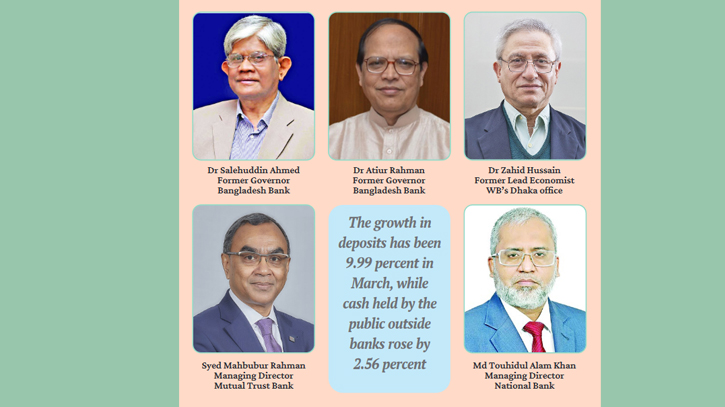
Photo: Messenger
Banks have struggled to attract deposits despite raising interest rates due to persistently high inflation for more than a year and various incidents that have eroded customer confidence. Consequently, the trend of holding cash outside banks has increased.
Those concerned say inflation remains prevalent, and most people are struggling to meet daily expenses. This has reduced their propensity to save compared to before. Moreover, the recent situation surrounding bank mergers has created a lack of confidence among the public, leading many to withdraw their deposits. As a result, the amount of cash held by individuals outside banks is increasing.
According to the central bank's report, the total deposits in the banking sector stood at 16 lakh 75 thousand 492 crores at the end of March this year. Compared to the same period last year, the growth in deposits has been 9.99 percent. Of this, term deposits increased by 10.37 percent, and current deposits increased by 7.64 percent. Earlier, the deposit growth rate was 10.43 percent in February and 10.57 percent in January.
The deposit growth rate was previously 11.04 percent in December 2023, which was the highest in the last 28 months. However, the deposit growth rate slowed down in September 2021 due to the economic downturn caused by the global recession during the coronavirus pandemic.
Regarding this, Syed Mahbubur Rahman, Managing Director and CEO of Mutual Trust Bank, told The Daily Messenger, “In 2022 and 2023, the world economy, including Bangladesh, went through a multifaceted crisis, which negatively impacted the deposits in the country's bank sector. During this time, Bangladesh Bank sold reserves amounting to about 10 billion dollars in the market, injecting an equivalent amount of Bangladeshi currency into Bangladesh Bank.”
“Additionally, due to various negative news reports, some customers have withdrawn money from banks. With high inflation, ordinary people lack funds to save. In fact, many have withdrawn their savings from banks. Furthermore, the current high inflation has increased the cost of living for people. Overall, bank deposits have declined slightly,” he added.
Md Touhidul Alam Khan, Managing Director of National Bank, told The Daily Messenger that every bank has some special deposit products. These should be delivered to the customer's doorstep. The bank's image should be enhanced through appropriate marketing or branding.
He also said, “The main foundation of any bank is retail deposits. Therefore, to address the deposit drought, emphasis should be placed on increasing retail deposits.”
Bangladesh Bank has continued its contractionary monetary policy stance to control inflation. As part of this, all types of interest rates, including the policy rate, have been continuously increased. Banks have also raised interest rates on both deposits and loans. Despite this, bank deposits are not increasing. In the last five months, deposit growth in the country's banking sector was the lowest in March, as people's tendency to hold cash outside banks has increased. Cash held by the public outside banks rose by 2.56 percent in March.
Meanwhile, the country's banking sector has faced a liquidity crunch due to reduced deposit inflows. Consequently, banks have reduced their investment in government treasury bills and bonds. Expiring bills and bonds have not been renewed, and banks are also cashing out many bills and bonds that have not yet matured.
Along with that, banks have also increased interest rates on deposits. Well-performing banks usually offer 9 to 10 percent interest to depositors, while many distressed banks are offering up to 12 percent interest on deposits.
Dr Atiur Rahman, the former governor of Bangladesh Bank, told The Daily Messenger, “When interest rates increase, bank deposits should also increase, as per economic principles. The central bank has made the interest rate market-driven. As a result, banks have increased the interest rate on deposits. This should lead to an increase in bank deposits.”
“However, people's daily expenditure has risen due to higher inflation. This may reduce the amount of savings,” he added.
According to central bank data, the amount of cash held by the public (currency outside banks) until last March was 2 lakh 61 thousand 195 crores, which is 3,621 crores more than in February and 2.56 percent higher than the same period last year. At the end of March the previous year, cash held by the public was 2 lakh 54 thousand 668 crores.
Regarding this, Dr Salehuddin Ahmed, the former governor of Bangladesh Bank, told The Daily Messenger, “The ongoing bank mergers are reducing customer confidence in banks. As a result, depositors are withdrawing money from banks. Additionally, high inflation is reducing people's saving capacity.”
Dr. Zahid Hussain, former lead economist at the World Bank's (WB) Dhaka office, told The Daily Messenger, “As March was a festive month, the demand for cash currency is expected to increase. Accordingly, the currency outside banks has increased, which seems normal.”
When asked why deposit growth has decreased, this economist said, "The saving capacity of common people has decreased due to the high inflation rate for many consecutive months. However, not everyone is suffering due to inflation. During such inflationary periods, the rich tend to get richer, and the poor get poorer."
Messenger/Disha








